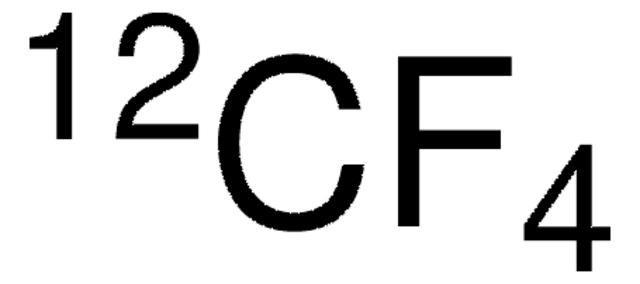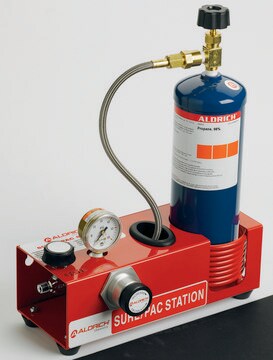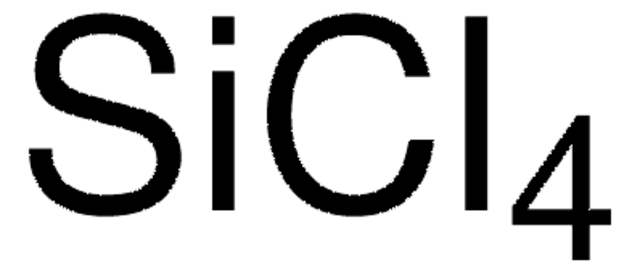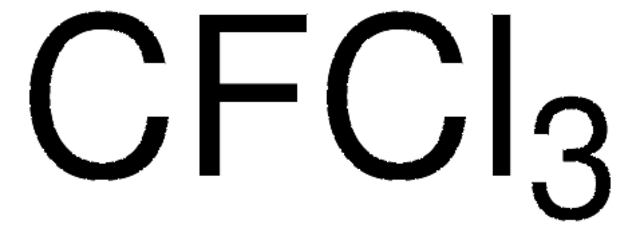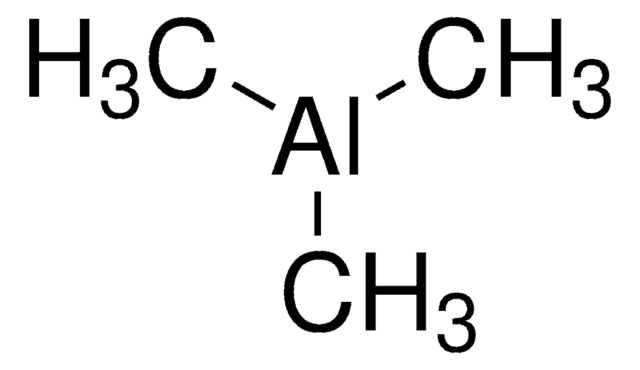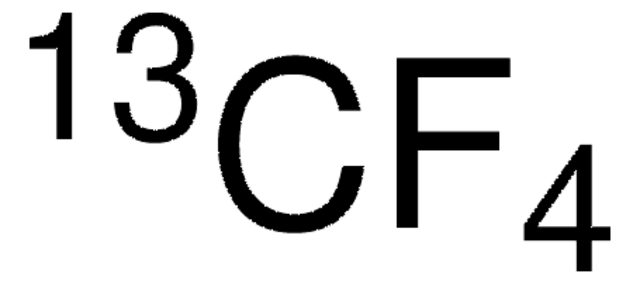295361
Hexafluoroethane
≥98%
Sinónimos:
CFC-116, Perfluoroethane
Iniciar sesiónpara Ver la Fijación de precios por contrato y de la organización
About This Item
Fórmula lineal:
CF3CF3
Número de CAS:
Peso molecular:
138.01
Número CE:
Número MDL:
Código UNSPSC:
12142100
ID de la sustancia en PubChem:
NACRES:
NA.22
Productos recomendados
densidad de vapor
4.7 (vs air)
Nivel de calidad
presión de vapor
430 psi ( 21 °C)
Ensayo
≥98%
bp
−78 °C (lit.)
mp
−100 °C (lit.)
grupo funcional
fluoro
cadena SMILES
FC(F)(F)C(F)(F)F
InChI
1S/C2F6/c3-1(4,5)2(6,7)8
Clave InChI
WMIYKQLTONQJES-UHFFFAOYSA-N
Envase
Supplied in a carbon steel lecture bottle with a CGA180M/CGA110F needle valve installed.
Compatible with the following:
Compatible with the following:
- Aldrich® lecture-bottle station systems
- Aldrich® lecture-bottle gas regulators
Otras notas
See Technical Information Bulletin AL-151 Gas Regulators: Selection, Installation, and Operation
Información legal
Aldrich is a registered trademark of Sigma-Aldrich Co. LLC
Opcional
Referencia del producto
Descripción
Precios
espiga
Referencia del producto
Descripción
Precios
regulador
también adquirido normalmente con este producto
Referencia del producto
Descripción
Precios
válvula de control
válvula de purga
Referencia del producto
Descripción
Precios
Palabra de señalización
Warning
Frases de peligro
Consejos de prudencia
Clasificaciones de peligro
Press. Gas Liquefied gas
Código de clase de almacenamiento
2A - Gases
Clase de riesgo para el agua (WGK)
WGK 3
Punto de inflamabilidad (°F)
Not applicable
Punto de inflamabilidad (°C)
Not applicable
Equipo de protección personal
Eyeshields, Gloves, multi-purpose combination respirator cartridge (US)
Elija entre una de las versiones más recientes:
¿Ya tiene este producto?
Encuentre la documentación para los productos que ha comprado recientemente en la Biblioteca de documentos.
Joseph J Tseng et al.
American journal of ophthalmology, 147(5), 875-885 (2009-02-06)
To determine the influence of lens status on postoperative intraocular pressure (IOP) in eyes undergoing vitrectomy for repair of recurrent retinal detachment (RD) resulting from proliferative vitreoretinopathy (PVR). Retrospective, consecutive, nonrandomized, single-center series. One hundred and forty-five eyes with recurrent
Arshed Malik et al.
European journal of ophthalmology, 22(3), 456-460 (2011-09-20)
To evaluate the role of postoperative prone posturing for a single night in the outcome of trans pars plana vitrectomy (TPPV) with internal limiting membrane (ILM) peel and 20% perfluoroethane (C2F6) internal tamponade for idiopathic macular hole. This prospective trial
Rachid Tahiri Joutei Hassani et al.
Graefe's archive for clinical and experimental ophthalmology = Albrecht von Graefes Archiv fur klinische und experimentelle Ophthalmologie, 251(5), 1285-1292 (2012-10-31)
To evaluate the factors affecting the postoperative intraocular pressure (IOP) decrease in 23-gauge (23-G) sutureless vitrectomy, including incision architecture evaluated by anterior segment spectral-domain optical coherence tomography (SD-OCT). A prospective cohort study of 43 patients who underwent primary transconjunctival 23-G
Felipe Eduardo Dhawahir-Scala et al.
Retina (Philadelphia, Pa.), 28(1), 60-65 (2008-01-11)
To evaluate the anatomic and functional success of phacovitrectomy and intraocular gas tamponade for macular hole surgery with only first night face down posturing. This was a nonrandomized observational prospective trial over 9 months, with data collection on 28 eyes
Ramin Tadayoni et al.
Ophthalmology, 118(1), 150-155 (2010-11-03)
To establish whether the success rate of surgery for small idiopathic macular holes (diameter, ≤ 400 μm) is significantly reduced if facedown positioning is replaced by simply taking care to avoid the supine position. Randomized, controlled, parallel-assignment, open-label, interventional, multicenter
Nuestro equipo de científicos tiene experiencia en todas las áreas de investigación: Ciencias de la vida, Ciencia de los materiales, Síntesis química, Cromatografía, Analítica y muchas otras.
Póngase en contacto con el Servicio técnico